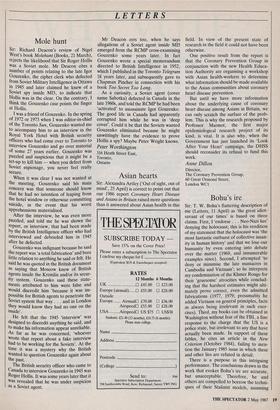LETTERS Mole hunt
Sir: Richard Deacon's review of Nigel West's book Molehunt (Books, 21 March), rejects the likelihood that Sir Roger Hollis was a Soviet mole. Mr Deacon cites a number of points relating to the late Igor Gouzenko, the cipher clerk who defected from Soviet Military Intelligence in Ottawa in 1945 and later claimed he knew of a Soviet spy inside MI5, to indicate that Hollis was in the clear. On the contrary, I think the Gouzenko case points the finger at Hollis.
I was a friend of Gouzenko. In the spring of 1972 or 1973 when I was editor-in-chief of the Toronto Sun, Gouzenko wanted me to accompany him to an interview in the Royal York Hotel with British security officers who had come over to Toronto to interview Gouzenko and go over material of some 27 years earlier. Gouzenko was puzzled and suspicious that it might be a set-up to kill him — when you defect from Soviet espionage, you never feel really secure.
When it was clear I was not wanted at the meeting, Gouzenko said his main concern was that someone should know that he had no intention of leaping from the hotel window or otherwise committing suicide, in the event that his worst apprehensions materialised.
After the interview, he was even more puzzled, and told me he was shown the report, or interview, that had been made by the British Intelligence officer who had interviewed and debriefed him in 1945 after he defected.
Gouzenko was indignant because he said the report was 'a total fabrication' and bore little relation to anything he said or felt. He said he was quoted in the British document as saying that Moscow knew of British agents inside the Kremlin and/or its secur- ity system. Gouzenko said these state- ments attributed to him were false and would discredit him 'because it was im- possible for British agents to penetrate the Soviet system that way . . . and in London they would know they had no one on the inside'.
He felt that the 1945 'interview' was designed to discredit anything he said, and to make his information appear unreliable. As far as he was concerned, 'whoever wrote that report about a fake interview had to be working for the Soviets'. At the time it was a mystery why the British wanted to question Gouzenko again about the past.
The British security officer who came to Canada to interview Gouzenko in 1945 was Roger Hollis. It was some years later that it was revealed that he was under suspicion as a Soviet agent. Mr Deacon errs too, when he says allegations of a Soviet agent inside MI5 emerged from the RCMP cross-examining Gouzenko some years later. In fact Gouzenko wrote a special memorandum directed to British Intelligence in 1952, which I published in the Toronto Telegram 18 years later, and subsequently gave to Chapman Pincher in connection with his book Too Secret Too Long.
As a curiosity, a Soviet agent (cover name Sabotka) defected in Canada in the late 1960s, and told the RCMP he had been `activated' to assassinate Igor Gouzenko. The good life in Canada had apparently corrupted him while he was in 'deep cover'. Could it be that the Soviets wanted Gouzenko eliminated because he might unwittingly have the evidence to prove Hollis a spy? Maybe Peter Wright knows, Peter Worthington
316 Heath Street East, Toronto, Ontario


















































 Previous page
Previous page